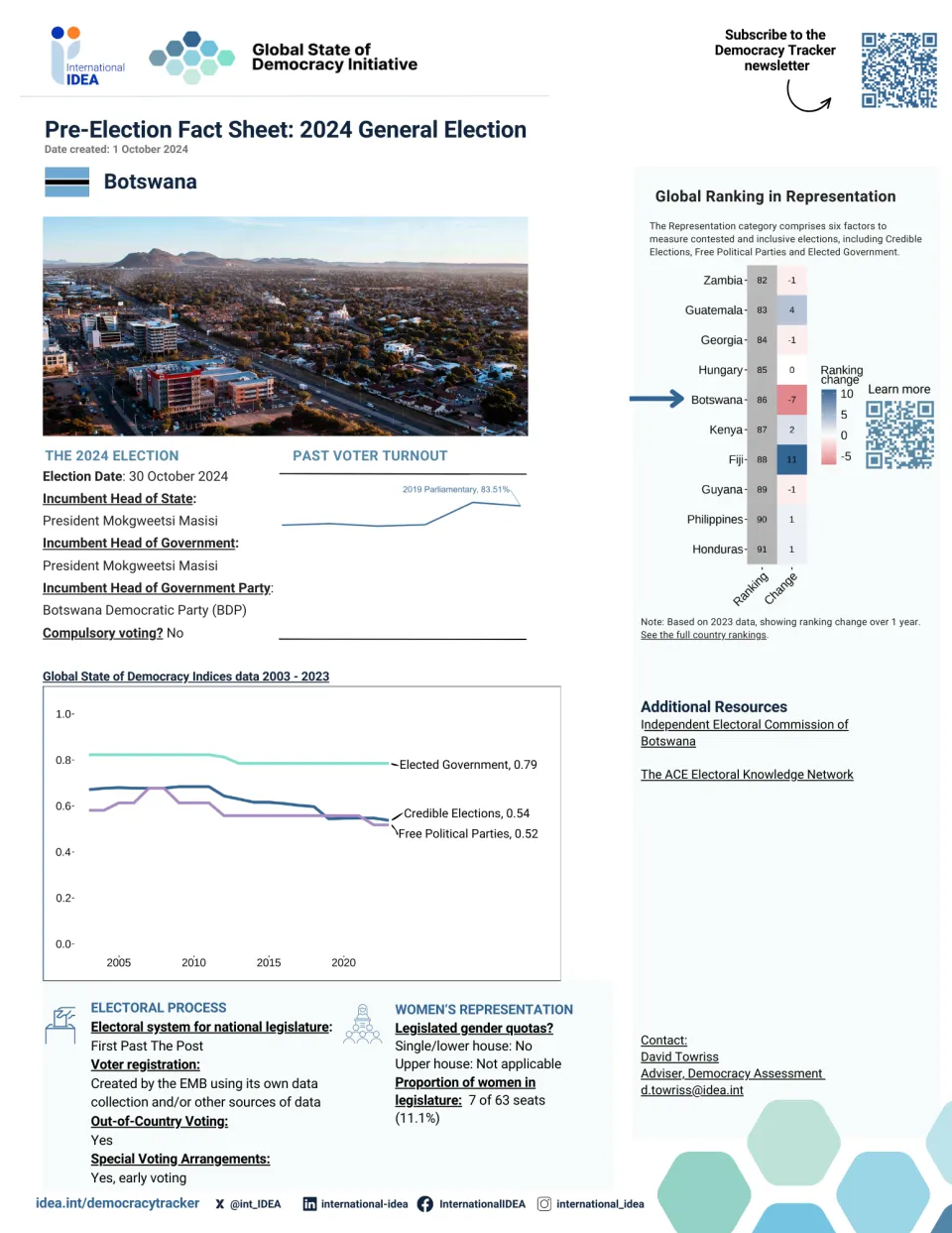
Botswana
Botswana exhibits mid-range performance across all four categories of the Global State of Democracy (GSoD) framework. Compared to 2019, it has advanced in Credible Elections and declined in Effective Parliament. Botswana is an upper-middle-income country and its economy is heavily reliant on diamond production, which constitutes over 70 per cent of exports and has made it vulnerable to market fluctuations. The country has been lauded for its management of its diamond resources, including its investments in health, education and infrastructure.
Present day Botswana has been inhabited for tens of thousands of years, initially by the San and other indigenous peoples, and later including the Tswana, who today make up the majority of the population. Botswana became a British protectorate in 1885, with the British governing indirectly through the chiefs, with little investment in social or physical infrastructure. At independence in 1966, Botswana was one of the world’s poorest countries. After independence, its newly-discovered diamond wealth sparked rapid economic development; the country soon established itself as one of Africa’s highest performing democracies. Its governance model is rooted in indigenous practices of participatory governance and leadership has consistently upheld multipartyism.
Botswana’s first alternation in political power, however, did not come until 2024, with the Botswana Democratic Party (BDP) having governed continuously for 58 years. In recent years, the balance of power has been a source of debate, especially as the executive exercises increasing influence in law-making processes. Corruption, the independence of the judiciary and other oversight bodies, and access to information are also salient governance issues. While Botswana has traditionally been a regional leader in its respect for civil and political rights, in 2023 the UN Human Rights Council raised concerns about the need for stronger rights protections. The country’s continued use of the death penalty is an important political issue and has also attracted international criticism, though the practice enjoys strong domestic support.
Despite critical investments made in human development, high inequality continues to be a challenge and a key social cleavage, disproportionately impacting the rural areas; roots of inequality can be traced to the colonial era. The San people have suffered multifaceted exclusion, and some members of the San community have been illegally evicted from ancestral lands in Kalahari.
Botswana continues to grapple with the HIV/AIDS epidemic, youth unemployment and gender equality gaps. It is a mid-performer in the GSoD’s Gender Equality measure, and struggles with low levels of female participation in politics and widespread gender-based violence. Yet, Botswana’s ratification of the Maputo Protocol and recent gender sensitive legislation signal prospects for advancing women’s rights. The LGBTQIA+ community faces stigma and discrimination, but some advances have come through the legalization of same sex relations and recent court judgements upholding LGBTQIA+ rights.
Looking ahead, it will be important to watch the newly elected government’s progress in implementing its human-rights centered approach to governance and its ambitious reform agenda. This includes proposals to strengthen the independence of the country’s anti-corruption agency and to increase parliamentary oversight of the Directorate of Intelligence and Security Service, a security agency that has been accused of perpetrating human rights abuses and targeting government opponents. Among the areas of democratic performance to watch in this regard are Absence of Corruption, Civil Liberties and Effective Parliament.
Last updated: July 2025
https://www.idea.int/democracytracker/
August 2025
Severe medical shortages prompt declaration of state of public health emergency
On 25 August, President Duma Boko declared a state of public health emergency in Botswana, after supply chain failures left the country critically short of medicines and other medical supplies. Earlier in the month, the Ministry of Health had announced it had suspended elective and non-urgent surgeries and warned that there were shortages of medicines to treat a variety of conditions, including hypertension, diabetes and cancer, as well as supplies such as bandages and sutures. Boko attributed the supply chain collapse to rising drug prices and inefficiencies within the national distribution system. In response to the crisis, he announced a BWP 250 million (approximately USD 17.35 million) emergency fund for medicines that were to be distributed with military oversight. The United Nations is also providing support.
Sources: British Broadcasting Corporation, The Guardian, The Botswana Gazette
October 2024
Ruling party defeated in general election, after 58 years in power

On 30 October, Botswana held general elections for the unicameral National Assembly and local councils. An opposition coalition, the Umbrella for Democratic Change (UDC), emerged as winners of the national contest, securing a majority of the vote (59.0 per cent) and 36 of the 61 elected National Assembly seats. They were followed by the Botswana Congress Party (15 seats; 24.6 per cent), the Botswana Patriotic Front (5 seats; 8.1 per cent) and the incumbent Botswana Democratic Party (4 seats; 6.6 per cent), which has ruled the country since independence in 1966. Of the 264 parliamentary candidates, 28 (10.6 per cent) were women; three won seats and three women were indirectly elected by the National Assembly, taking the number of female representatives to 6 (8.7 per cent of the total 69 seats) - down from 7 (10.8 per cent) in 2019. International observers assessed the elections to have been peaceful and orderly, but raised several concerns, including inadequate civic education, the under-representation of women among candidates, and various logistical issues.
Sources: Daily News Botswana, Daily Maverick, Voice of America, Gender Links, The Electoral Commissions Forum of SADC Countries, Southern African Development Community
See all event reports for this country
Global ranking per category of democratic performance in 2024
Basic Information
Human Rights Treaties
Performance by category over the last 6 months
Election factsheets
Global State of Democracy Indices
Hover over the trend lines to see the exact data points across the years
Factors of Democratic Performance Over Time
Use the slider below to see how democratic performance has changed over time
